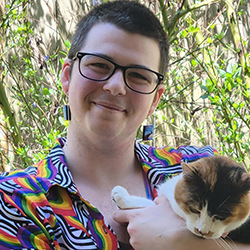Beautiful Meanings in Beautiful Things
Those who find beautiful meanings in beautiful things are the cultivated. For these there is hope.
—Oscar Wilde, The Picture of Dorian Gray
You tell your mother your name on a sweltering May afternoon. She takes a sip of a margarita, passes it to you; you take a sip, pass it back. The lime curls cold on your tongue. She stares at the budding breasts nestled under your shirt. She can’t see, but the flesh spills over the cups like wine, and the bra straps bite into your shoulders, and you wish she’d taught you how to size yourself. She used to want a daughter, but now she inspects you like a specimen.
Your grandmother wanted to be a man, she tells the melting margarita slush. Did you know that? Not sure when she stopped. Dad still loves her, I think. They make it work. She looks up at you, finally; a tiny smile dawns on her face. I still love you, too. You’ll always be my son, no matter who you are.
She reaches to hug you, and you stick together with sweat. If she can feel the weight of your changed body through the layers of damp cloth, she doesn’t say. Alcohol dribbles from the glass in her hand. It’ll stain, you think, like piss on your first girl shirt. You’ll have to throw it out, buy another from Walmart for four ninety-nine if you can afford to.
I love you, she says again, but she uses someone else’s name to do it.
Later that summer, your grandfather buries the husband you never knew he had.
While your mother weeps into a growing mountain of tissues, your grandfather, hunched like wheat in the wind, shows you the man you never got to meet. The wedding photo you knew—grandfather in his threadbare suit, the familiar stranger beside him in a dress they both despised, the two of them heavy and grimacing—is gone. In its place is a single Polaroid, framed and dust-free, of two young men in the back of a bar. Their eyes glint scarlet; the light from the camera flash flames off their rings, plain bands like the one your grandfather wears now. The two men in the photo hold each other with one hand and share a bouquet of lush, green blooms in the other. Your photo-grandfather’s pinky caresses his—husband’s. His fingernails are painted, soft, in sunset pink.
He always liked carnations, he says to you in the present. You wonder if the man in the photo sounded like this, voice ragged and trembling with age. His favorite writer was Oscar Wilde.
She—he—your grandmother—your grandfather’s husband never told you that. But you suppose you could fill a novel with things they never told you. History you never got to learn.
Why? you ask, smoothing over their Polaroid faces with the supple pads of your fingers. Your nails, too, are painted. Black, black, black. A coat for every mourning.
Your grandfather swipes the sweat from his forehead; it seeps into the white of his sleeve. He couldn’t—in public, just at home. And then, when your mom was old enough to start talking, old enough for people to start listening… There’s a clench in his jaw, strain behind his eyes like miles of barbed wire. It was lose her or live a lie. Not much of a choice, was there?
You glance back toward the living room where your mother’s sniffles have turned to sobs hard enough to make her cough. She never told me, you murmur. She just said… But of course, you can’t risk breaking his heart by telling him.
Yeah, your grandfather sighs, voice soft and fragile as silk. Well. She chooses to forget, I think. We didn’t raise her to view people like that, but hate—ignorance finds a way. Always has. He places a hand on your arm, and the warmth leeches through the suit jacket she’d begged you to wear. But it’s better now. Isn’t it?
You never told him, but he knows. How could he not? Your mother might avert her gaze, pretend you never told her, but it’s obvious in the shape of your body, the way you hold yourself, the voice training you’ve done, who you’ve become.
Mostly. You stare holes into your shoes. They were your dad’s. Sometimes.
Your grandfather pulls you in for an embrace; he’s warm, solid, alive, real, and he knows. You wind your arms around him, too—and his body feels so frail and small, somehow, like one hard squeeze would dissolve him.
When you were little, inclined to boys’ clothes and the name your parents gave you, there was a moment. A man in your grandparents’ kitchen, thick-limbed and willow-tall. He looked like your grandmother but not; he wore her face and someone else’s body. His eyes were wide and wet like an ocean you’d not yet seen.
You’re early. Your grandfather snatched you up from behind, spinning you into giggles. How’s my favorite grandson?
I don’t know, you chimed, how is he?
Handsome as ever, I think, your grandfather said, a grin splitting his face in two. His cheeks were blooming pink and dappled with moisture. Were you too heavy? Was he that old? He seemed younger, the last time you saw him. He seemed more alive.
You kissed each of those cheeks, and he kissed yours in turn, and when you looked back to the kitchen, the other man was gone.
Maybe he’d never been there at all.
You get his real name tattooed on your chest, above your heart, above your breasts, surrounded in a garden of green carnations. Your grandfather never wept at his funeral, his wake, but he does when you tell him this, his heart wrenched open, raw and trembling.
For him, you say. And you.
And you, he tells you, holding your head in his hands. They seem so much smaller than they used to. He kisses your forehead; tears trail down the ever-deep lines of his face. My favorite granddaughter.
You bend down to rest your forehead on his shoulder. I wish I could have known him. I wish he could have known me, too.
Oh, darling. He would have loved you.
He calls you by your name, like he knew it all along.

Avery Briar (they/them) is a nonbinary writer, bookseller, and creative writing student with too many feelings. They live in the Pacific Northwest with their cat and an uncountable number of books.

